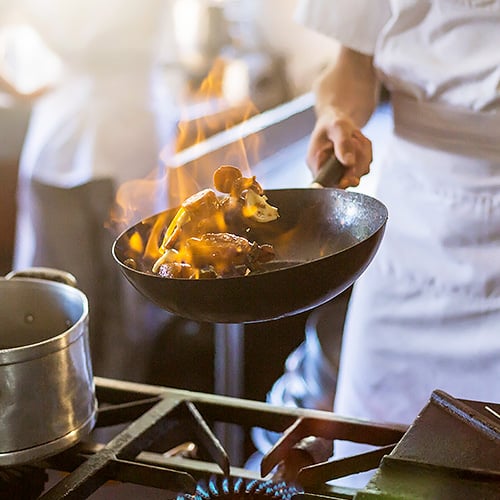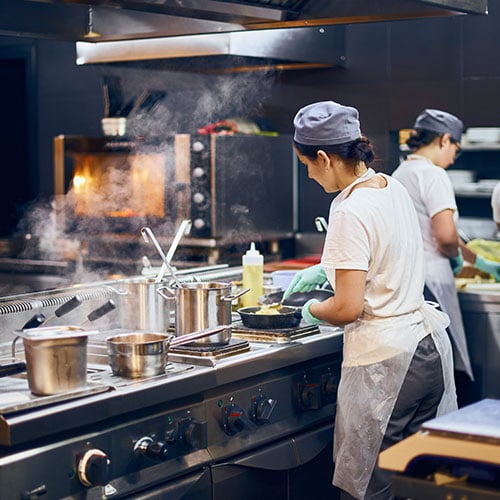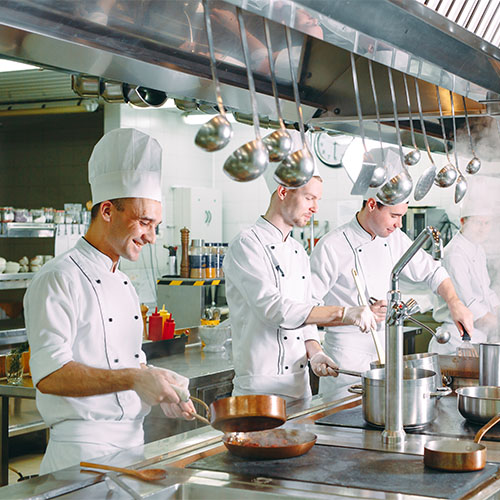If you're considering a career as a chef, you're stepping into a dynamic and challenging industry that offers a range of opportunities. Becoming a chef requires a passion for food, creativity, and a strong work ethic. With the demand for skilled culinary professionals on the rise, pursuing a career as a chef can lead to a rewarding and fulfilling path in the culinary world. We created a list of considerations to help you decide if it is the right career path for you.
1. Education and Training

Education and training are essential components of becoming a successful chef. While a formal culinary education is not always required, many chefs choose to attend culinary school to gain a solid foundation in cooking techniques, food safety, and kitchen management. Ultimately, a combination of education, training, and practical experience is key to excelling in the culinary field. Here are some ways you can obtain the education and training needed as an aspiring chef:
- Culinary School: Attending a reputable culinary school can provide you with the essential knowledge and hands-on experience needed to excel in the kitchen. Culinary programs often cover a wide range of topics, including cooking techniques, food safety, nutrition, and kitchen management. You'll want to consider if the cost of culinary school is right for your budget.
- Degree Programs: Many chefs choose to pursue an Associate's or Bachelor's degree in culinary arts or a related field. These programs offer a more comprehensive education and can open doors to higher-paying positions in the culinary industry.
- Apprenticeships: Another valuable way to gain practical and hands-on experience in the kitchen is through internship and apprenticeship programs. Working under the guidance of experienced chefs allows you to learn on the job and develop your skills in a real-world setting.
- Certifications: Obtaining foodservice certifications, such as ServSafe or Certified Executive Chef (CEC), can demonstrate your expertise and commitment to excellence in the culinary field. These credentials can help you stand out to potential employers and advance your career.
- Continued Learning: The culinary industry is constantly evolving, so it's important to stay current with the latest foodservice trends and techniques. Consider attending workshops, seminars, and culinary competitions to expand your knowledge and network with other professionals in the field.
2. Physical Demands

Working in a busy kitchen can be an extremely physically demanding job, between standing all day to cuts and burns. Staying physically fit and healthy, including regular exercise and proper nutrition, is essential for chefs to perform their tasks efficiently and avoid injury.
- Strength and Stamina: Working as a chef in a commercial kitchen requires individuals to be on their feet for long hours throughout a shift. Chefs often work in fast-paced environments where they are required to stand, walk, lift heavy objects, and bend frequently as they move about the kitchen. Non-slip shoes with proper insoles or hiking boots are recommended for chefs to reduce the fatigue they experience during their work day.
- Dexterity: The nature of the job involves working with sharp knives to chop ingredients quickly and precisely. Chefs will also be around hot surfaces and heavy cooking equipment, which requires them to have good hand-eye coordination and physical dexterity.
- Heat Tolerance: Chefs are also exposed to high levels of heat and steam in commercial kitchens. This environment can be especially challenging during busy periods when the kitchen is bustling with activity, especially during lunch and dinner rushes.
3. Work Hours

The culinary industry often involves long hours, resulting in restaurant schedules that include evenings, weekends, and holidays. It is not uncommon for chefs to work more than 40 hours per week, especially during busy seasons or in high-pressure environments such as fine dining restaurants or catering companies. The following are some of the attributes chefs should have to thrive in the foodservice industry:
- Must Have a Flexible Schedule: Chefs are expected to arrive early to prepare for service and stay late beyond an 8-hour shift to ensure that the kitchen is clean and properly stocked for the next day.
- Must Have Time Management Skills: The nature of the job often requires chefs to work under tight deadlines and handle multiple tasks simultaneously, which can contribute to the long hours worked in a kitchen setting.
- Must Be Able to Work under Pressure: In addition to the physical demands of the job, the mental and emotional toll of working long hours can also impact chefs. The high-stress environment, pressure to perform consistently at a high level, and the need to meet customer expectations can lead to burnout if not managed effectively.
Despite the challenges of long work hours, many chefs find fulfillment in their work and are passionate about creating culinary masterpieces. While your social life may be impacted, having an understanding support system while pursuing a career as a chef can greatly improve your experience and success in this dynamic and rewarding field.
4. Kitchen Hierarchy

In the culinary world, the path to becoming a successful chef often involves moving through the hierarchical ranks within a kitchen. Advancing to the position of executive chef requires dedication, hard work, and a passion for cooking from the very beginning as a line cook. As you progress in a professional kitchen, you'll gain valuable experience, develop your culinary skills, and take on more responsibilities which will ultimately shape your career trajectory and culinary style. Understanding the different roles and responsibilities at each level can provide valuable insights for aspiring chefs, with each position offering unique growth opportunities:
- Line Cook: The entry-level position in a professional kitchen is the commis chef or line cook. They are responsible for assisting the more experienced chefs with food preparation and other kitchen tasks. This role provides a solid foundation for learning essential culinary skills and techniques.
- Senior Chef: As a senior chef (also known as a chef de partie or station chef), individuals are assigned to a specific station or area of the kitchen, such as the saute station or pastry section. This position requires more specialized knowledge and expertise in a particular aspect of cooking.
- Sous Chef: The sous chef serves as the second-in-command in the kitchen, working closely with the head chef to oversee the kitchen operations. This role involves supervising kitchen staff, managing inventory, and ensuring that dishes are prepared to the highest standards.
- Executive Chef: The head chef, also known as the executive chef, is responsible for overseeing the entire kitchen operation. This position involves menu planning, recipe development, staff management, and maintaining high standards of food quality and presentation.
- Chef-Owner: The group chef or chef-owner is the individual who opened their own restaurant. They are responsible for setting the culinary direction of the kitchen, managing budgets, hiring restaurant staff, and ensuring that the overall dining experience meets the restaurant's standards.
The most important thing to keep in mind throughout the kitchen hierarchy is the comradery in your line regardless of which stage of life you are in. With the hectic nature of a busy kitchen, bonding with your coworkers can make the whole operation more enjoyable and run smoother. At the end of the day, you're a team sharing the same goal and experience.
5. Customer Satisfaction

One of the key considerations for aspiring chefs is the delicate balance between creative vision and customer satisfaction. While creativity is essential in the culinary world, it is equally important to cater to the preferences and expectations of your customers. As a chef, your ultimate goal should be to create dishes that not only showcase your culinary skills but also resonate with your customers. Understanding their preferences, dietary restrictions, and cultural backgrounds is essential in creating a menu that appeals to a diverse range of tastes. Find that balance between your guests and vision by:
- Hosting a soft opening
- Regularly collecting customer feedback
- Conducting taste tests for new items
- Staying up-to-date with foodservice trends
Under some circumstances, customer satisfaction will take precedence over creative flare, particularly in the event of a kitchen or service error. This can be mitigated with a comped meal or discount. However, these instances should be handled on a case-by-case basis. In most cases, customer feedback should help you fine-tune your menu but shouldn’t overpower what makes your restaurant unique. After all, your style and innovative dishes are what set you apart from other chefs in the industry.
A Word from Our Chef

"Being a chef is a lifestyle choice. It’s more than a career. You have made the choice to serve and not be served. Cold food sitting on a milk crate is your only break and late night gatherings with coworkers are your family functions. But despite all that, your unique taste, edgy personality, and witty banter is not only welcomed but it’s celebrated. The kitchen is one of the few places in world where we don’t care who or what you are. If I can count on you to get stuff done during the stresses of the dinner rush, you are good in my book."
- Larry Williams (WebstaurantStore Chef)
While the path to becoming a chef may require dedication, hard work, and perseverance, the potential for personal and professional growth is immense. If you have a passion for cooking and a desire to bring joy to others through food, pursuing a career as a chef may be the perfect choice for you. Whether you aspire to work in a restaurant, hotel, catering company, or even start your own culinary business, the skills and experience gained as a chef can open doors to a wide range of exciting career paths.



